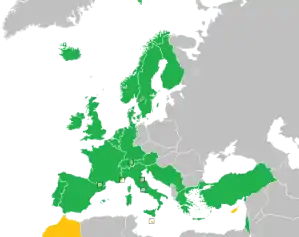Eurovision Song Contest 1988
The Eurovision Song Contest 1988 was the 33rd edition of the annual Eurovision Song Contest. The contest took place on 30 April 1988 in Dublin, Ireland, following the country's win at the previous 1987 edition. The presenters were Pat Kenny and Michelle Rocca. The host broadcaster was Radio Telefís Éireann (RTÉ) which revamped the show's production style compared to its earlier editions, in order to appeal to a younger audience.
| Eurovision Song Contest 1988 | |
|---|---|
 | |
| Dates | |
| Grand final | 30 April 1988 |
| Host | |
| Venue | RDS Simmonscourt Pavilion, Ballsbridge, Dublin, Ireland |
| Presenter(s) | |
| Musical director | Noel Kelehan |
| Directed by | Declan Lowney |
| Executive supervisor | Frank Naef |
| Executive producer | Liam Miller |
| Host broadcaster | Raidió Teilifís Éireann (RTÉ) |
| Opening act | Johnny Logan performing "Hold Me Now" |
| Interval act | Hothouse Flowers performing "Don't Go" |
| Website | eurovision |
| Participants | |
| Number of entries | 21 |
| Debuting countries | None |
| Returning countries | None |
| Non-returning countries | |
Participation map
| |
| Vote | |
| Voting system | Each country awarded 12, 10, 8-1 point(s) to their 10 favourite songs |
| Nul points | |
| Winning song | "Ne partez pas sans moi" |
The winner was Switzerland with the song "Ne partez pas sans moi", performed by Canadian singer Céline Dion and composed by Atilla Şereftuğ with lyrics in French by Nella Martinetti. Switzerland beat the United Kingdom by just a point in the last vote to win the title. Twenty-one countries took part, after an initial plan of twenty-two, as Cyprus was disqualified for breaching the contest's rules by being published a few years earlier, in an attempt to represent the country at a prior edition of the contest. The Cypriot song had been drawn to be performed 2nd in the running order.
Location
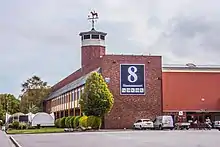
Dublin is the capital and largest city of Ireland. Dublin is in the province of Leinster on Ireland's east coast, at the mouth of the River Liffey. Founded as a Viking settlement, the Kingdom of Dublin became Ireland's principal city following the Norman invasion. The city expanded rapidly from the 17th century and was briefly the second largest city in the British Empire before the Acts of Union in 1800. Following independence in 1922, Dublin became the capital of the Republic of Ireland.
The contest took place at the Simmonscourt Pavilion of the Royal Dublin Society, which was normally used for agricultural and horse shows. The same venue hosted the 1981 contest. The staging of the contest in Dublin in 1988 formed part of Dublin’s year long celebration of 1000 years since it was established by Scandinavian settlers in 988.
Format
Graphic design
Host broadcaster RTÉ employed Declan Lowney, who was notable for being a director of music videos and youth programming, as director for this edition, in order to revamp the contest to attract and sustain a younger audience. The traditional scoreboard was replaced with two giant Vidiwalls located on either side of the stage, which also projected live images of the performers from the green room where the competitors set during the votes announcements, and a new computer-generated scoreboard was used.
The stage itself, conceived by Paula Farrell under chief production designer Michael Grogan, was also the largest and most elaborate ever constructed for the Eurovision Song Contest. To compensate for the fact that the vast stage took up most of the room in what is really an average size exhibition hall, the director deliberately darkened the hall where the audience was located and refused to use wide angled shots of the audience, in order to create the illusion of the venue being bigger than it actually was.
The Postcards featured the participants doing things in Ireland from culture, to tradition, to sports or sightseeing.
Lowney was also the director of the show's interval act, introduced after the competing songs and before the votes announcement. The interval act was a video of the popular Irish rock group Hothouse Flowers, which was filmed in eleven countries around Europe and was the most expensive music video ever produced in Ireland at the time.
Voting
Each country had a jury who awarded 12, 10, 8, 7, 6, 5, 4, 3, 2 and 1 point(s) for its top ten songs.
This edition features one of the closest and most fickle-ending votes in the history of the contest. With three countries left to vote, the UK was well in the lead with 133 points against Switzerland's 118. With the third last country, France, only awarding Switzerland one point, the UK looked certain of victory, as even if Switzerland scooped the two final 12s, the UK would only need to gather eleven points from three juries combined to be unbeatable. However, France didn't award the UK any points, and the following country, Portugal, gave the UK a meagre three points while giving the maximum 12 to Switzerland, making the contest blown open between the two countries until the end of the voting.
With the conclusion of voting from the penultimate jury, the UK was holding a five-point lead over Switzerland. As the final jury, that of Yugoslavia, began to award its points in the customary ascending order, a lot of excitement-sighs were heard from the audience to see how the two rivals for victory would fare. Switzerland was the first to be named with six points, edging it into a one-point lead over the UK. After earlier strong votes from most countries to the UK, it seemed highly likely that the UK would be given one of the higher remaining set of points. However as Yugoslavia announced its seven, eight, ten and twelve points, it transpired that it had awarded the UK no points at all (12 points from Yugoslavia went to France), [n 1] and Switzerland was left with its one-point lead to savour a dramatic triumph.
Conductors
Each performance had a conductor who was maestro to the orchestra, except for Iceland and Italy. Unlike in most years, the conductors took their bows after each song, not before.
 Iceland – No conductor
Iceland – No conductor Sweden – Anders Berglund
Sweden – Anders Berglund Finland – Ossi Runne
Finland – Ossi Runne United Kingdom – Ronnie Hazlehurst
United Kingdom – Ronnie Hazlehurst Turkey – Turhan Yükseler
Turkey – Turhan Yükseler Spain – Javier de Juan
Spain – Javier de Juan Netherlands – Harry van Hoof
Netherlands – Harry van Hoof Israel – Eldad Shrem
Israel – Eldad Shrem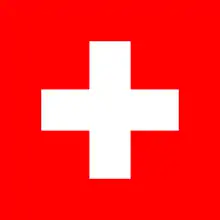 Switzerland – Atilla Şereftuğ
Switzerland – Atilla Şereftuğ Ireland – Noel Kelehan
Ireland – Noel Kelehan Germany – Michael Thatcher
Germany – Michael Thatcher Austria – Harald Neuwirth
Austria – Harald Neuwirth Denmark – Henrik Krogsgård
Denmark – Henrik Krogsgård Greece – Charis Andreadis
Greece – Charis Andreadis Norway – Arild Stav
Norway – Arild Stav.svg.png.webp) Belgium – Daniel Willem
Belgium – Daniel Willem Luxembourg – Régis Dupré
Luxembourg – Régis Dupré Italy – No conductor
Italy – No conductor France – Guy Matteoni
France – Guy Matteoni Portugal – José Calvário
Portugal – José Calvário.svg.png.webp) Yugoslavia – Nikica Kalogjera
Yugoslavia – Nikica Kalogjera
Participants
Twenty-one countries took part, after an initial plan of twenty-two, as Cyprus was disqualified after it had already submitted an entry. Cypriot broadcaster CyBC had selected the song 'Thimame' sung by Yiannis Dimitrou, and at a late stage saw that the song was ineligible to represent them as it had been entered into the Cypriot selection for the 1984 Contest, where it had finished in 3rd place. This was classed as a breach of the Cypriot rules of selecting their entry at this time as well as an infringement of the Eurovision Song Contest rules. It was a very late decision as the song was already drawn to perform second in the contest, advertised in the Radio Times information about the preview programme of the contest, and appears as song number two in accordance to its initial performance draw, on the record release “Melodi Grand Prix 1988” – the compilation disc of the contest’s entries.
This was the second victory for Switzerland at the Eurovision Song Contest after winning its first edition in 1956, and the last time a song in French won the contest, the language having dominated the event in earlier years.
The contest helped launch an international career for two artists, the winner for Switzerland Céline Dion and Luxembourg’s representative Lara Fabian. French-Canadian Céline Dion was only famous in the French-speaking world at the time of the contest, shortly afterwards started recording songs in English.[1] Belgian-Canadian Lara Fabian started a successful career after the contest with becoming established in various countries worldwide, with a mainly French-sung repertoire.[1] The UK entry was written and composed by Julie Forsyth, the daughter of the entertainer Bruce Forsyth who was present. When interviewed afterwards he was particularly annoyed at the Dutch jury not having given a vote to the UK, as they had done some work there.
The contest saw the return of seven artists who had participated in its previous editions: Denmark's Kirsten & Søren represented the country in 1984 and 1985, Finland's Boulevard represented the country in 1987 as Vicky Rosti's backing group, Israel's Re'uven Gvirtz and Yehuda Tamir, winners of the contest in 1979 as part of Milk and Honey returned to Eurovision as backing singers for Yardena Arazi, who represented the country in 1976 as part of the group Chocolat, Menta, Mastik. Arazi had hosted the contest in 1979,[n 2] Portugal's Dora represented the country in 1986, Sweden's Tommy Körberg represented the country in 1969, and Turkey's MFÖ represented the country in 1985.
Results
Score sheet
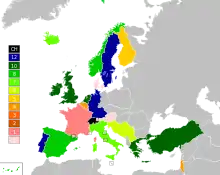
| Juries | |||||||||||||||||||||||
|---|---|---|---|---|---|---|---|---|---|---|---|---|---|---|---|---|---|---|---|---|---|---|---|
| Iceland | 20 | 1 | 4 | 4 | 1 | 2 | 8 | ||||||||||||||||
| Sweden | 52 | 3 | 2 | 8 | 5 | 8 | 12 | 1 | 3 | 10 | |||||||||||||
| Finland | 3 | 3 | |||||||||||||||||||||
| United Kingdom | 136 | 1 | 5 | 10 | 12 | 10 | 10 | 5 | 7 | 10 | 10 | 10 | 6 | 5 | 12 | 8 | 12 | 3 | |||||
| Turkey | 37 | 4 | 1 | 5 | 1 | 8 | 8 | 4 | 6 | ||||||||||||||
| Spain | 58 | 2 | 5 | 2 | 6 | 8 | 1 | 8 | 2 | 6 | 6 | 8 | 4 | ||||||||||
| Netherlands | 70 | 6 | 6 | 7 | 7 | 2 | 6 | 12 | 12 | 5 | 7 | ||||||||||||
| Israel | 85 | 6 | 6 | 4 | 6 | 3 | 10 | 1 | 5 | 2 | 3 | 10 | 5 | 3 | 10 | 10 | 1 | ||||||
| Switzerland | 137 | 7 | 12 | 5 | 10 | 10 | 8 | 10 | 4 | 10 | 12 | 10 | 8 | 4 | 1 | 7 | 1 | 12 | 6 | ||||
| Ireland | 79 | 7 | 2 | 3 | 2 | 12 | 6 | 4 | 7 | 6 | 7 | 7 | 5 | 4 | 5 | 2 | |||||||
| Germany | 48 | 8 | 5 | 1 | 3 | 5 | 6 | 6 | 4 | 2 | 8 | ||||||||||||
| Austria | 0 | ||||||||||||||||||||||
| Denmark | 92 | 10 | 3 | 4 | 1 | 12 | 6 | 1 | 4 | 4 | 12 | 10 | 7 | 12 | 6 | ||||||||
| Greece | 10 | 3 | 7 | ||||||||||||||||||||
| Norway | 88 | 5 | 8 | 7 | 12 | 7 | 1 | 8 | 1 | 3 | 5 | 7 | 3 | 4 | 7 | 10 | |||||||
| Belgium | 5 | 5 | |||||||||||||||||||||
| Luxembourg | 90 | 4 | 10 | 12 | 7 | 5 | 12 | 12 | 1 | 2 | 2 | 6 | 8 | 2 | 4 | 3 | |||||||
| Italy | 52 | 8 | 4 | 7 | 8 | 2 | 5 | 3 | 2 | 8 | 5 | ||||||||||||
| France | 64 | 2 | 3 | 8 | 2 | 2 | 3 | 3 | 7 | 3 | 5 | 1 | 2 | 10 | 1 | 12 | |||||||
| Portugal | 5 | 4 | 1 | ||||||||||||||||||||
| Yugoslavia | 87 | 12 | 6 | 1 | 8 | 7 | 12 | 2 | 3 | 4 | 12 | 4 | 7 | 6 | 3 | ||||||||
12 points
Below is a summary of all 12 points in the final:
|
|
Commentators
Participating countries
 Iceland – Hermann Gunnarsson (Sjónvarpið)[4]
Iceland – Hermann Gunnarsson (Sjónvarpið)[4] Sweden – Bengt Grafström (TV2)[5]
Sweden – Bengt Grafström (TV2)[5] Finland – Erkki Pohjanheimo (YLE TV1)[6]
Finland – Erkki Pohjanheimo (YLE TV1)[6] United Kingdom – Terry Wogan (BBC1)[7]
United Kingdom – Terry Wogan (BBC1)[7] Turkey – Bülend Özveren (TV1)
Turkey – Bülend Özveren (TV1) Spain – Beatriz Pécker (TVE2)[8]
Spain – Beatriz Pécker (TVE2)[8] Netherlands – Willem van Beusekom (Nederland 3)[9]
Netherlands – Willem van Beusekom (Nederland 3)[9] Israel – No commentator
Israel – No commentator Switzerland – German: Bernard Thurnheer (DRS), French: Serge Moisson (SSR),[10] Italian: Ezio Guidi (TSI)[11]
Switzerland – German: Bernard Thurnheer (DRS), French: Serge Moisson (SSR),[10] Italian: Ezio Guidi (TSI)[11] Ireland – Ronan Collins (RTÉ 1)
Ireland – Ronan Collins (RTÉ 1) Germany – Nicole and Claus-Erich Boetzkes (Erstes Deutsches Fernsehen)[12]
Germany – Nicole and Claus-Erich Boetzkes (Erstes Deutsches Fernsehen)[12] Austria – Ernst Grissemann (FS1)[13]
Austria – Ernst Grissemann (FS1)[13] Denmark – Jørgen de Mylius (DR TV)[14]
Denmark – Jørgen de Mylius (DR TV)[14] Greece – Dafni Bokota (ET1)[15]
Greece – Dafni Bokota (ET1)[15] Norway – John Andreassen (NRK)[16]
Norway – John Andreassen (NRK)[16].svg.png.webp) Belgium – French: Pierre Collard-Bovy (RTBF La Une),[17] Dutch: Luc Appermont (BRT TV1)[18]
Belgium – French: Pierre Collard-Bovy (RTBF La Une),[17] Dutch: Luc Appermont (BRT TV1)[18] Luxembourg – French: Valérie Sarn (RTL Télévision),[17] German: Oliver Spiecker (RTL plus)
Luxembourg – French: Valérie Sarn (RTL Télévision),[17] German: Oliver Spiecker (RTL plus) Italy – Daniele Piombi (Raitre)[19]
Italy – Daniele Piombi (Raitre)[19] France – Lionel Cassan (Antenne 2)[17]
France – Lionel Cassan (Antenne 2)[17] Portugal – Margarida Mercês de Melo (RTP1)[20]
Portugal – Margarida Mercês de Melo (RTP1)[20].svg.png.webp) Yugoslavia – Mladen Popović (TVB1), Oliver Mlakar (TVZ 1), Marjeta Keršič Svetel (TVLJ1)
Yugoslavia – Mladen Popović (TVB1), Oliver Mlakar (TVZ 1), Marjeta Keršič Svetel (TVLJ1)
Non-participating countries
.svg.png.webp) Australia – N/A (SBS TV)
Australia – N/A (SBS TV).svg.png.webp) Cyprus - Dafni Bokota (RIK - simulcast with ET1)
Cyprus - Dafni Bokota (RIK - simulcast with ET1)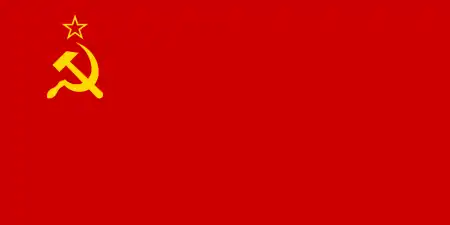 Soviet Union - Unknown
Soviet Union - Unknown
Radio
Some participating countries did not provide radio broadcasts for the event; the ones who did are listed below.
 Sweden – Kalle Oldby (SR P3)[5]
Sweden – Kalle Oldby (SR P3)[5] Finland – TBC (YLE 2-verkko)
Finland – TBC (YLE 2-verkko) United Kingdom – Ken Bruce (BBC Radio 2)
United Kingdom – Ken Bruce (BBC Radio 2) Turkey – Şebnem Savaşçı (TRT Radyo 3)
Turkey – Şebnem Savaşçı (TRT Radyo 3) Netherlands – Ben Cramer (Radio 3)
Netherlands – Ben Cramer (Radio 3) Israel – Yigal Ravid (Reshet Gimel)
Israel – Yigal Ravid (Reshet Gimel) Ireland – Larry Gogan (RTÉ Radio 1)
Ireland – Larry Gogan (RTÉ Radio 1) Germany – Peter Urban (Deutschlandfunk/NDR Radio 2)
Germany – Peter Urban (Deutschlandfunk/NDR Radio 2) Austria – Hans Leitinger (Hitradio Ö3)
Austria – Hans Leitinger (Hitradio Ö3) Denmark – Poul Birch Eriksen (DR P3)
Denmark – Poul Birch Eriksen (DR P3) Greece – Dimitris Konstantaras (Proto Programma)
Greece – Dimitris Konstantaras (Proto Programma) Norway – Leif Erik Forberg (NRK P2)
Norway – Leif Erik Forberg (NRK P2).svg.png.webp) Belgium – French: Stéphane Dupont & Patrick Duhamel (RTBF La Première), Dutch: Julien Put & Herwig Haes (BRT Radio 2)
Belgium – French: Stéphane Dupont & Patrick Duhamel (RTBF La Première), Dutch: Julien Put & Herwig Haes (BRT Radio 2) Luxembourg – André Torrent (RTL Radio)
Luxembourg – André Torrent (RTL Radio) Italy – Antonio De Robertis (Rai Radio 2)
Italy – Antonio De Robertis (Rai Radio 2) France – Julien Lepers (France Inter)
France – Julien Lepers (France Inter)
Spokespersons
 Iceland - Guðrún Skúladóttir[4]
Iceland - Guðrún Skúladóttir[4] Sweden - Maud Uppling[5]
Sweden - Maud Uppling[5] Finland - Solveig Herlin[21]
Finland - Solveig Herlin[21] United Kingdom - Colin Berry
United Kingdom - Colin Berry Turkey - Canan Kumbasar
Turkey - Canan Kumbasar Spain - Matilde Jarrín
Spain - Matilde Jarrín Netherlands – Joop van Os
Netherlands – Joop van Os Israel - Yitzhak Shim'oni[22]
Israel - Yitzhak Shim'oni[22] Switzerland - Michel Stocker[23]
Switzerland - Michel Stocker[23] Ireland - John Skehan
Ireland - John Skehan Germany - Corry von Kiel
Germany - Corry von Kiel Austria - Tilia Herold
Austria - Tilia Herold Denmark - Bent Henius
Denmark - Bent Henius Greece - Fotini Giannoulatou[24]
Greece - Fotini Giannoulatou[24] Norway - Andreas Diesen[25]
Norway - Andreas Diesen[25].svg.png.webp) Belgium - Jacques Olivier
Belgium - Jacques Olivier Luxembourg - Jean-Luc Bertrand
Luxembourg - Jean-Luc Bertrand Italy - Mariolina Cannuli
Italy - Mariolina Cannuli France - Catherine Ceylac
France - Catherine Ceylac Portugal - Maria Margarida Gaspar[20]
Portugal - Maria Margarida Gaspar[20].svg.png.webp) Yugoslavia - Miša Molk[26]
Yugoslavia - Miša Molk[26]
National jury members
The size of the national juries changed this year from 11 to 16 members, and this lasted until 1997.
 Iceland - Árni Gunnarsson, Ásgeir Guðnason, Davíð Sveinsson, Elín Þóra Stefánsdóttir, Ellý Þorðardóttir, Erla Björk Jónasdóttir, Guðrún Kristmannsdóttir, Hólmfríður Jónsdóttir, Jónas Engilbertsson, Jónína Bachmann, Kjartan Þor Kjartansson, Ólafur Egilsson, Sigrún Kristjánsdóttir, Sigurður Fanndal, Sigurður Ægisson, Þórdís Garðarsdóttir[4]
Iceland - Árni Gunnarsson, Ásgeir Guðnason, Davíð Sveinsson, Elín Þóra Stefánsdóttir, Ellý Þorðardóttir, Erla Björk Jónasdóttir, Guðrún Kristmannsdóttir, Hólmfríður Jónsdóttir, Jónas Engilbertsson, Jónína Bachmann, Kjartan Þor Kjartansson, Ólafur Egilsson, Sigrún Kristjánsdóttir, Sigurður Fanndal, Sigurður Ægisson, Þórdís Garðarsdóttir[4] Finland – Ilpo Hakasalo[27]
Finland – Ilpo Hakasalo[27] United Kingdom – Nicola Chapman, Terry Clarke, Alfred Collet, Geoff Dennis, James Douglas, Alison Fox, Mike Goss, Carol Holroyd, Muir Johnson, Karen Marsden, Mavis Masters, Molly Roberts, Andrew Sidell, Renate Smith, Paul Tunnicliffe, Robert Unsworth
United Kingdom – Nicola Chapman, Terry Clarke, Alfred Collet, Geoff Dennis, James Douglas, Alison Fox, Mike Goss, Carol Holroyd, Muir Johnson, Karen Marsden, Mavis Masters, Molly Roberts, Andrew Sidell, Renate Smith, Paul Tunnicliffe, Robert Unsworth Spain – Pepe Barroso (businessman), Paquita Torres (former model and Miss Europe), Mario Pardo (actor), Lola Forner (actress), José Coronado (actor), Analía Gadé (actress), Miguel Báez "El Litri" (bullfighter), Laura Valenzuela (actress and TV host, presenter of Eurovision Song Contest 1969), Antonio de Senillosa (writer), Cyra Toledo (fashion model), José Oneto (journalist), María Vidaurreta (PhD in Political Sciences and lecturer), Jorge Sanz (actor), Emma Suárez (actress), Caty Arteaga (dancer), Jaime Andrada (architect)
Spain – Pepe Barroso (businessman), Paquita Torres (former model and Miss Europe), Mario Pardo (actor), Lola Forner (actress), José Coronado (actor), Analía Gadé (actress), Miguel Báez "El Litri" (bullfighter), Laura Valenzuela (actress and TV host, presenter of Eurovision Song Contest 1969), Antonio de Senillosa (writer), Cyra Toledo (fashion model), José Oneto (journalist), María Vidaurreta (PhD in Political Sciences and lecturer), Jorge Sanz (actor), Emma Suárez (actress), Caty Arteaga (dancer), Jaime Andrada (architect) Netherlands – Hans van den Berg, Bert Tuk
Netherlands – Hans van den Berg, Bert Tuk Ireland - Bill Cleary
Ireland - Bill Cleary Denmark – Anni Thorslund Larsen
Denmark – Anni Thorslund Larsen Greece – Alexandros Roussos
Greece – Alexandros Roussos
Notes
- Yugoslavia, as being the last jury to announce its votes, had caused the same situation to happen when after their voting UK lost to Spain by 1 point in the 1968 Contest.
- With this, she became the first person to compete in the contest after hosting an earlier edition; before her, there were few competitors that hosted later editions of the contest.
References
- "Eurovision Song Contest 1998". European Broadcasting Union official website – History by year section. Retrieved 5 March 2012.
- "Eurovision Song Contest 1988". The Diggiloo Thrush. Retrieved 5 March 2012.
- "Eurovision Song Contest 1988". 4Lyrics.eu. Retrieved 16 September 2020.
- "Fór út með vinningsglampann í sólgleraugunum segir Sverrir Stormsker". Mbl.is. Retrieved 10 August 2012.
- "Infosajten.com". Infosajten.com. Archived from the original on 18 July 2012. Retrieved 10 August 2012.
- "Selostajat ja taustalaulajat läpi vuosien? • Viisukuppila". Viisukuppila.fi. Retrieved 10 August 2012.
- Eurovision Song Contest 1988 BBC Archives
- "FORO FESTIVAL DE EUROVISIÓN • Ver Tema - Uribarri comentarista Eurovision 2010". Eurosongcontest.phpbb3.es. Archived from the original on 17 March 2012. Retrieved 10 August 2012.
- "Welkom op de site van Eurovision Artists". Eurovisionartists.nl. Retrieved 10 August 2012.
- "serge moissons : vidéo". serge-moisson.com. Retrieved 10 August 2019.
- "Eurovision Rewind/1988: festa Svizzera per un punto. E l'Italia…". eurofestivalnews.com. Retrieved 10 August 2019.
- "Eurovision Song Contest 1988". Ecgermany.de. Retrieved 10 August 2012.
- Archived 24 October 2007 at the Wayback Machine
- "Forside". esconnet.dk. Archived from the original on 24 March 2012. Retrieved 10 August 2012.
- "Η Δάφνη Μπόκοτα και η EUROVISION (1987-2004)". Retromaniax.gr. Archived from the original on 12 September 2012. Retrieved 10 August 2012.
- "Hvem kommenterte før Jostein Pedersen? - Debattforum". Nrk.no. Archived from the original on 2 November 2012. Retrieved 10 August 2012.
- Christian Masson. "1988 - Dublin". Songcontest.free.fr. Retrieved 10 August 2012.
- Adriaens, Manu & Loeckx-Van Cauwenberge, Joken. Blijven kiken!. Lannoo, Belgium. 2003 ISBN 90-209-5274-9
- "Luca Barbarossa Ti scrivo Eurofestival 1988". YouTube. 16 December 2010. Retrieved 10 August 2012.
- "Comentadores Do ESC - escportugalforum.pt.vu | o forum eurovisivo português". 21595.activeboard.com. Archived from the original on 21 April 2012. Retrieved 10 August 2012.
- "Selostajat ja taustalaulajat läpi vuosien? • Viisukuppila". Viisukuppila.fi. Retrieved 10 August 2012.
- "פורום אירוויזיון". Sf.tapuz.co.il. 13 September 1999. Archived from the original on 8 October 2011. Retrieved 10 August 2012.
- Baumann, Peter Ramón (OGAE Switzerland)
- "Εκφωνητές της ΕΡΤ για τις ψήφους της Ελλάδας στην EUROVISION - Page 3". Retromaniax.gr. Archived from the original on 11 September 2012. Retrieved 10 August 2012.
- Dyrseth, Seppo (OGAE Norway)
- "Sumnja od Jugolasvenskog glasanja". Evropesma.org. Archived from the original on 8 April 2012. Retrieved 10 August 2012.
- http://www.viisukuppila.fi/phpBB3/viisula/topic7042.html#p871555
External links
| Wikimedia Commons has media related to Eurovision Song Contest 1988. |
